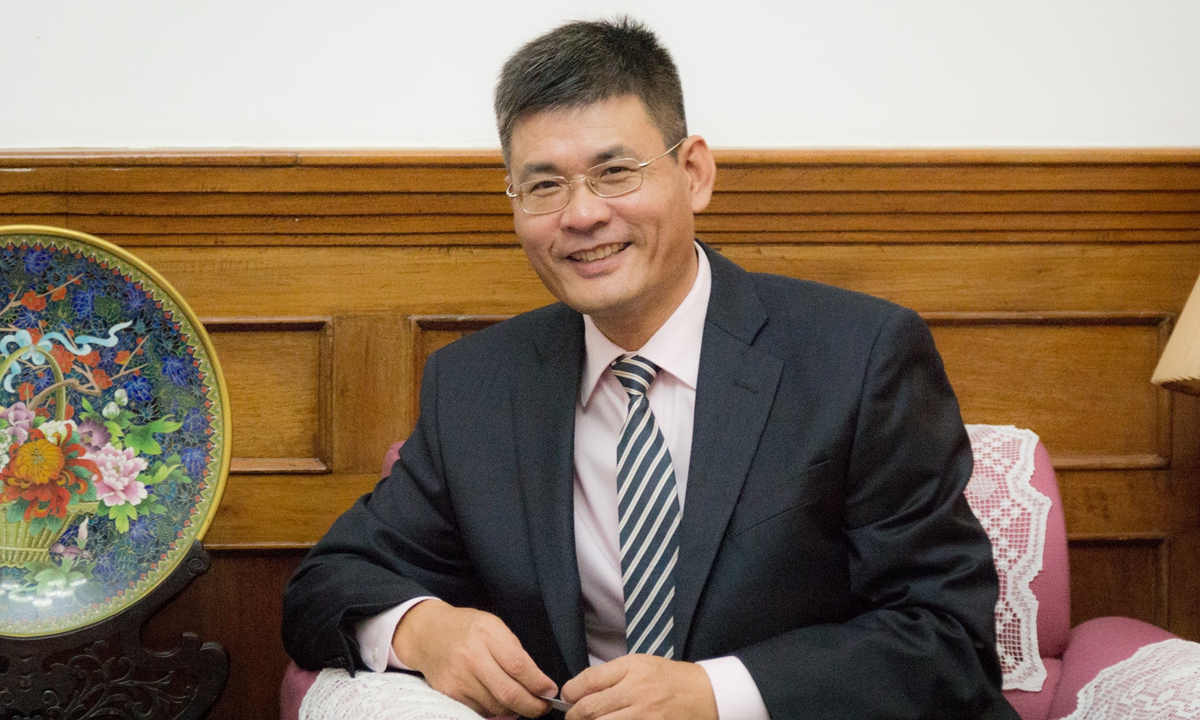Being a diplomat is like standing on a bungee jumping platform: diplomat-turned-novelist
By Zhang Ni Source: Global Times Published: 2020/11/16 17:38:40
Yang Youming, former Chinese ambassador to Zambia and minister-counselor of the Chinese Embassy in the US, now has a new identity - a novelist.

"I am now a writer, and my pen name is Lu Shan," Yang said as he smiled and introduced himself to the Global Times. In his hand he had a stack of stories printed on paper - talking points that he prepared in advance based on the interview outline.
"This is a professional habit," Yang explained.
Perhaps it is precisely because of this rigorous habit that the ambassador's writing feels particularly fresh.
Recently, Yang completed the online serialization of Bungee Jumping as Lu Shan. The story is about the arduous journey of a senior diplomat, who was assigned to a tropical island country to establish an embassy on his own.
"Bungee Jumping is a metaphor, reflecting the ups and downs and challenges of diplomatic work," he said.
"For me, being a diplomat and being a writer are mutually reinforcing. Without the experience of a diplomat, I couldn't write diplomatic novels. If I was not a writer, I couldn't tell you wonderful diplomatic stories. This award is great encouragement and gives me hope for the future development of 'diplomatic novels.' I'd like to spend the rest of my life writing diplomatic literature so that more people can understand diplomats and China's diplomatic efforts," Yang told the Global Times.

Yang first thought of writing novels about 15 years ago. By then, he served as the deputy director-general of the Policy Planning Department under the Ministry of Foreign Affairs and as the secretary-general of the Society of Diplomatic History of the People's Republic of China.
The society runs a publication that features rich and colorful memoirs from diplomats. Some recall stories of the leaders of the elderly generation, others detail major diplomatic events, and some record diplomatic life experiences. Some articles are about sharing knowledge, some seek to enlighten readers, and others move readers' souls.
In time, Yang and his team compiled these articles into a four-volume book titled Diplomatic Episodes.
After the book was published, Yang felt that he wanted to do more, so he planned to find a way to write these stories into works of fiction so that more people can understand the lives of diplomats. More stories were collected and about seven or eight years ago, he began to try to write novels in his spare time.
"Most domestic and diplomatic officials write poetry, prose or memoirs. As for purely fictitious diplomatic novels, at least I have not found any, nor have I read such works abroad. I don't know if there is any term for diplomatic literature , but I hope our literature can be given a place," Yang said.
Bungee Jumping is the second diplomatic novel that Yang has written, but the first to be published as his first one is still under revision. While Bungee Jumping was not derived from his personal experience, it was inspired by the four books he had compiled years before.
"In the history of Chinese diplomacy, there was a man who built an embassy. It was in the 1990s and became the basis for this novel. Few people know that even now we have many micro-diplomatic institutions abroad, with only two or three people," he elaborated.
"Because of our country's diplomatic needs, they kept their diplomatic positions in unspoken places in obscurity," he continued.
Therefore, the real character of the novel is not one person, but a group as the experience of many diplomats contributed to the novel.
"I wrote this book to pay tribute to all my diplomatic predecessors and peers who have contributed to China's diplomacy, and to encourage a new generation of diplomats who have continued to grow," Yang noted.
For him, the biggest challenge was switching his writing style from habitual research reports to fictions. How to get a grasp on the threads of the story and how to portray the characters were all difficult for him.
"I wrote the first draft and sent it to a literary editor, but it was rejected. After revising the second draft, she gave me some acknowledgement but thought that the elements of the novel were still lacking, as it still had traces of a documentary. In the third draft, I changed from writing in the third person to the first person, added a puppy named Huang Mao to accompany the protagonist and changed the title of the book from One Person's Embassy to Bungee Jumping. There is actually a chapter about bungee jumping in the book," Yang recalled.
The main character finds that the relationship he has established between two countries is changing. Because of distress at sea, he comes down with a high fever and dreams of bungee jumping as he nods off. It is a dream that reminds him of handling diplomatic affairs.
"You don't know what is waiting for you. People are always in a state of high tension, just like standing on a bungee jumping platform," he said.
Yang also shared how he tested the water by posting his work online.
"I think this draft should look more like a novel. Since diplomatic novels are a new genre, whether it could be self-contained, and whether it could be accepted by readers, no one knew," Yang said.
Publishing his work on the internet put his worries to rest.
"It happened that a friend recommended me to visit a literary website, and I have a perceptual understanding of the power of the internet. Of course, I published my work online as an experiment. But now it appears that this attempt was beneficial," he affirmed.

Yang also shared the reason why he laments in the novel that the essential characteristic of diplomats is loneliness.
The loneliness of diplomats is determined by the particularity of diplomatic work. "We are often far away from our relatives, and we are away for several years. We have friends all over the world, but few long-term friends. Because we live abroad, we rarely have friends in China. The greatest loneliness is spiritual," Yang said.
From his point of view, being an ambassador is the ultimate in loneliness.
"The nation entrusts a country to you, and you need to maintain the relationship between two countries. When the relationship is not going well, you will face a lot of pressure. No one can replace you at this time, and no one can even help you. You need to make decisions alone and take responsibility alone," he stressed.

Diplomat-turned-novelist Yang Youming
Based on his own experience as a diplomat, Yang's novel Bungee Jumping created a new genre, for which it recently won second prize at the 2020 Yangtze River Online Literature Competition."I am now a writer, and my pen name is Lu Shan," Yang said as he smiled and introduced himself to the Global Times. In his hand he had a stack of stories printed on paper - talking points that he prepared in advance based on the interview outline.
"This is a professional habit," Yang explained.
Perhaps it is precisely because of this rigorous habit that the ambassador's writing feels particularly fresh.
Recently, Yang completed the online serialization of Bungee Jumping as Lu Shan. The story is about the arduous journey of a senior diplomat, who was assigned to a tropical island country to establish an embassy on his own.
"Bungee Jumping is a metaphor, reflecting the ups and downs and challenges of diplomatic work," he said.
"For me, being a diplomat and being a writer are mutually reinforcing. Without the experience of a diplomat, I couldn't write diplomatic novels. If I was not a writer, I couldn't tell you wonderful diplomatic stories. This award is great encouragement and gives me hope for the future development of 'diplomatic novels.' I'd like to spend the rest of my life writing diplomatic literature so that more people can understand diplomats and China's diplomatic efforts," Yang told the Global Times.

Book cover of Bungee Jumping Photo: Courtesy of Linksure Literature
Building your own embassyYang first thought of writing novels about 15 years ago. By then, he served as the deputy director-general of the Policy Planning Department under the Ministry of Foreign Affairs and as the secretary-general of the Society of Diplomatic History of the People's Republic of China.
The society runs a publication that features rich and colorful memoirs from diplomats. Some recall stories of the leaders of the elderly generation, others detail major diplomatic events, and some record diplomatic life experiences. Some articles are about sharing knowledge, some seek to enlighten readers, and others move readers' souls.
In time, Yang and his team compiled these articles into a four-volume book titled Diplomatic Episodes.
After the book was published, Yang felt that he wanted to do more, so he planned to find a way to write these stories into works of fiction so that more people can understand the lives of diplomats. More stories were collected and about seven or eight years ago, he began to try to write novels in his spare time.
"Most domestic and diplomatic officials write poetry, prose or memoirs. As for purely fictitious diplomatic novels, at least I have not found any, nor have I read such works abroad. I don't know if there is any term for diplomatic literature , but I hope our literature can be given a place," Yang said.
Bungee Jumping is the second diplomatic novel that Yang has written, but the first to be published as his first one is still under revision. While Bungee Jumping was not derived from his personal experience, it was inspired by the four books he had compiled years before.
"In the history of Chinese diplomacy, there was a man who built an embassy. It was in the 1990s and became the basis for this novel. Few people know that even now we have many micro-diplomatic institutions abroad, with only two or three people," he elaborated.
"Because of our country's diplomatic needs, they kept their diplomatic positions in unspoken places in obscurity," he continued.
Therefore, the real character of the novel is not one person, but a group as the experience of many diplomats contributed to the novel.
"I wrote this book to pay tribute to all my diplomatic predecessors and peers who have contributed to China's diplomacy, and to encourage a new generation of diplomats who have continued to grow," Yang noted.
For him, the biggest challenge was switching his writing style from habitual research reports to fictions. How to get a grasp on the threads of the story and how to portray the characters were all difficult for him.
"I wrote the first draft and sent it to a literary editor, but it was rejected. After revising the second draft, she gave me some acknowledgement but thought that the elements of the novel were still lacking, as it still had traces of a documentary. In the third draft, I changed from writing in the third person to the first person, added a puppy named Huang Mao to accompany the protagonist and changed the title of the book from One Person's Embassy to Bungee Jumping. There is actually a chapter about bungee jumping in the book," Yang recalled.
The main character finds that the relationship he has established between two countries is changing. Because of distress at sea, he comes down with a high fever and dreams of bungee jumping as he nods off. It is a dream that reminds him of handling diplomatic affairs.
"You don't know what is waiting for you. People are always in a state of high tension, just like standing on a bungee jumping platform," he said.
Yang also shared how he tested the water by posting his work online.
"I think this draft should look more like a novel. Since diplomatic novels are a new genre, whether it could be self-contained, and whether it could be accepted by readers, no one knew," Yang said.
Publishing his work on the internet put his worries to rest.
"It happened that a friend recommended me to visit a literary website, and I have a perceptual understanding of the power of the internet. Of course, I published my work online as an experiment. But now it appears that this attempt was beneficial," he affirmed.

Diplomat-turned-novelist Yang Youming attends the 2020 Yangtze River Online Literature Competition award ceremony. Photo: Courtesy of Linksure Literature
Spiritual lonelinessYang also shared the reason why he laments in the novel that the essential characteristic of diplomats is loneliness.
The loneliness of diplomats is determined by the particularity of diplomatic work. "We are often far away from our relatives, and we are away for several years. We have friends all over the world, but few long-term friends. Because we live abroad, we rarely have friends in China. The greatest loneliness is spiritual," Yang said.
From his point of view, being an ambassador is the ultimate in loneliness.
"The nation entrusts a country to you, and you need to maintain the relationship between two countries. When the relationship is not going well, you will face a lot of pressure. No one can replace you at this time, and no one can even help you. You need to make decisions alone and take responsibility alone," he stressed.
Posted in: CULTURE & LEISURE,ARTS FOCUS